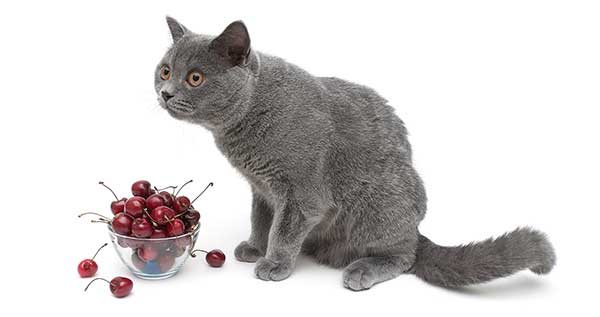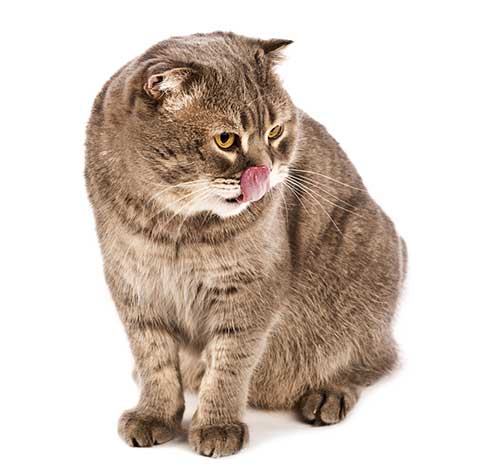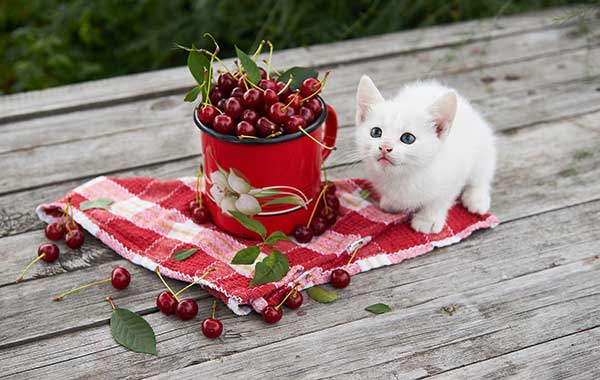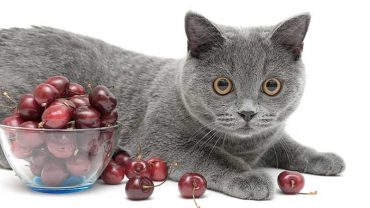Nearly all pets love human food; there’s no doubt about that.
Even when we don’t readily offer it to them, you will often find your pets sneaking up behind your back to help themselves to the food in your kitchen.
But are all human foods safe for pets? For instance, can cats eat cherries? The short answer is “yes”, cats can eat cherry fruit.
Depending on your cat’s level of curiosity and how quickly she develops a taste for fruits, she may actually be blown away by cherries.
However, remember that your feline isn’t a vegan. As an obligate carnivore, a cat’s digestive system is only developed to process meat.
However, offering cherries to them as an occasional treat shouldn’t be a cause for concern. But again, that depends on the amount as well as part of the plant you feed your cat.
Table of Contents
Possible Health Benefits of Cherries to Cats
Cherries come with a host of health benefits, not only to humans but to cats as well.
The following are some of these benefits;
1. Lowering the Risks of Chronic Diseases
Cherries contain an abundance of antioxidants and anti-inflammatory compounds.
These compounds help in combating oxidative stress, thereby preventing your feline from developing multiple chronic infections such as cancer and diabetes.
The compounds are also instrumental in preventing premature aging and mental deterioration. Antioxidants like polyphenols have been widely associated with an ability to prevent cellular damage, fight inflammations, and boost overall immunity.

2. Managing Arthritis
Arthritis is a common debilitating disease, not only in humans but also among cats. Thankfully, cherries can offer a reliable and long-lasting remedy.
Most notably, studies have shown that cherries can help improve the symptoms of gout.
Gout is a more severe form of arthritis that occurs when uric acid builds up in your cat’s system. It’s worse than regular arthritis and could lead to acute inflammation and joint pains.
3. Improving Sleep and Digestion
Cherries also come with sleep-boosting benefits for your furry, little friend. Cats don’t really suffer from insomnia. However, certain environmental factors may make it difficult for them to fall asleep.
For example, cats take time to acclimatize to new surroundings. So if you recently moved apartments, your feline might experience difficulties falling asleep for the first few days in her new home.
When cats don’t get ample sleep, they often become irritable. They can scratch and paw incessantly, as well as engage in other self-destructive behavior.
By giving your cat doses of the cherry fruit, you can help restore her sleep patterns. Cherries significantly boost melatonin levels, making your cat have quality sleep.

Besides sleep, cherries can also aid your feline’s digestion. The fruit boasts high amounts of fiber and water content. This combination can help relieve digestive issues like constipation and incontinence.
Also, you can leverage the high water content in cherries to help a dehydrated cat.
4. Improving the Health of Your Cat’s Heart
Lastly, cherries can help boost the health and vitality of your cat’s heart. These fruits contain potassium and polyphenol antioxidants, both of which are associated with a reduction in the risks of heart disease.
Potassium especially helps restore irregular heart rates as well as eliminates excess sodium from your cat’s body.
A regular dose of cherries will help your cat have normal blood pressure. Polyphenol antioxidants like catechins, anthocyanins, and flavonols protect your cat’s heart against cellular damage and inflammations.
Apart from these, are lots of other health and nutritional benefits of cherries that your feline friend might enjoy. But having looked at these potential advantages, the question remains; is it safe for cats to eat cherries?
Can Cats Eat Cherries? Always Proceed With Caution
Before offering cherries to your cat, always pay attention to the parts you’re feeding her. Which might bring us to the question, are cherry trees toxic to cats?
While cherry fruits are generally considered harmless to cats, the same cannot be said about the cherry trees.
? Cherry shrub comes with a level of toxicity, due to traces of cyanide within the plant. And by plant, we mean everything else apart from the fruit. For example, the leaves, stems, the roots, and even the pit of the cherry fruit.

Feeding any of these parts to your cat could lead to cyanide poisoning. Cyanide poisoning manifests in various symptoms depending on the severity of poisoning.
Common symptoms include irritability, difficulty in breathing, discolored gums, dilated pupils, and eventual death if help doesn’t arrive fast. Apart from toxicity, choking is another potential danger of consuming other parts of the cherry plant.
Lastly, cherries might also cause gastrointestinal issues if the cat doesn’t eat the fruit properly.
Remember, cherries are considered foreign foods among felines. Therefore, it’s important that your cat carefully digests the fruit instead of gulping it down whole. Otherwise, it might experience constipation or diarrhea.
Can Kittens Eat Cherries?
Unfortunately, kittens cannot eat cherries. That’s because they’re more sensitive to foods considered potentially harmful to cats.
Due to their small size, kittens may experience severe choking hazards. Cyanide poisoning could also be more profound, leading to a quick death.

Kittens require soft foods as their teeth aren’t already well-developed. Speaking of soft foods, can cats eat cherry yogurt? What of cherry pie? Can cats eat cherry pie?
The problem isn’t really the pie or the yogurt, but rather the flavorings or food coloring added to them. Yogurt contains significant amounts of artificial sugars and fats. That makes it potentially dangerous for cats.
On the other hand, most pies are prepared with dough, which is also considered toxic for cats. If you must feed cherry pie or cherry yogurt to your feline friend, ensure you go through the ingredients before purchasing the food.
Avoid anything with excess sugars, salts, trans fats, and artificial sweeteners. Your best bet is to prepare cherry pie or cherry yogurt at home, using all-natural ingredients.
Conclusion
Evidently, cats can eat cherries. You only need to ensure you’re giving her the fruit and not any other part of the plant.
Also, remove the pit as it might choke your cat, in addition to exposing her to potential cyanide poisoning. As you introduce cherries to your cat, check for any allergic reactions.
If the cat reacts adversely, withdraw the fruit immediately and consult your vet.
Most importantly, do not replace your cat’s staple diet with cherries. Instead, only offer the fruit as an occasional treat; either as a health remedy or a nutritional supplement.



